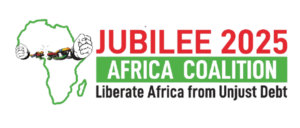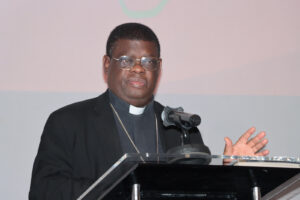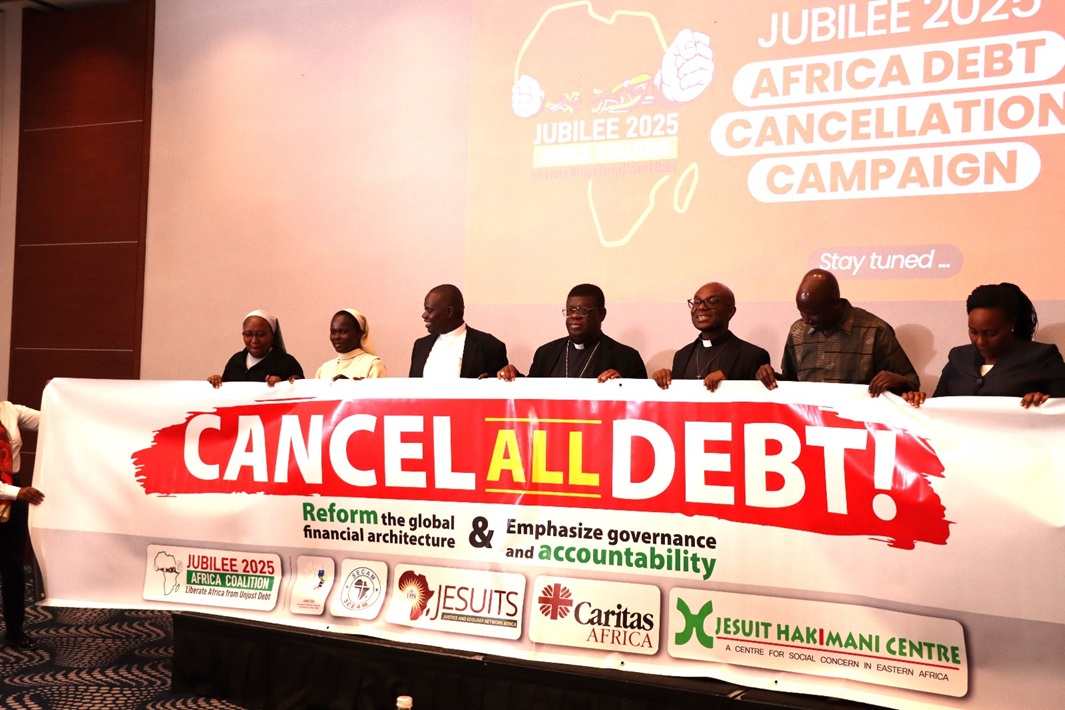By Paschal Norbert
NAIROBI, FEBRUARY 13, 2025 (CISA)– Africa stands at a crossroads, crippled by unsustainable debt that threatens the well-being of millions. With seven African nations already in debt distress and many more on the brink, the economic crisis has left governments struggling to provide essential services like healthcare, education, and infrastructure.
On February 12, 2025, at the Radisson Blu Hotel in Nairobi, Kenya, history was made as the Jubilee 2025 Africa Debt Cancellation Campaign was officially launched. The campaign, unveiled by Rt Rev Charles Kasonde, Chairman of the Association of Member Episcopal Conferences in Eastern Africa (AMECEA), is supported by a coalition of faith-based and justice organizations advocating for economic justice, debt cancellation, and a fairer global financial system.
Speaking at the launch, Bishop Kasonde emphasized the moral and historical significance of the Jubilee campaign: “The ongoing debt crisis continues to affect many nations, particularly across the African continent. As we launch the Jubilee 2025 Africa Debt Cancellation Campaign, let us embrace the spirit of Jubilee, a concept deeply rooted in history and moral obligation. Originating from biblical traditions, Jubilee calls for periodic debt forgiveness and the restoration of economic freedom. It symbolizes a beacon of hope, a promise of renewal, and a remedy for the structural inequalities that have persisted for far too long.”
Bishop Kasonde stressed that the issue of debt goes beyond economic concerns and should be seen as a moral responsibility that demands urgent intervention.
Quoting Pope Francis, he added, “Pope Francis reminds us that debt forgiveness is more than just an economic necessity, it is a profound moral responsibility. When debt burdens amplify poverty, entrench inequality, and stifle economic growth, we are called to act. The weight of debt should never be an instrument of oppression but rather a challenge that compels us to seek justice and equity.”
The Jubilee 2025 Africa Debt Cancellation Campaign is a continuation of efforts initiated by the Catholic Church and the Global Manifest Movement, both of which have long championed debt relief as a pathway to sustainable development.
Bishop Kasonde highlighted the past successes of such movements, stating, “The Jubilee 2000 campaign, for example, led to the cancellation of over $100 billion in debt for some of the world’s most neglected nations. This milestone freed vital resources for healthcare, education, and infrastructure. However, the relief we secured was not enough to remedy the systemic flaws within the global financial system. To this day, African nations remain at the mercy of an ongoing debt crisis.”
Beyond just advocating for debt cancellation, the campaign calls for comprehensive financial reforms to prevent African nations from falling back into the cycle of debt entrapment.

Bishop Kasonde outlined the mission of the campaign, stating, “We seek comprehensive global financial reforms aimed at breaking the cycle of debt entrapment that has plagued our nations for generations. We advocate for responsible borrowing and lending practices that uphold justice and equity. It is imperative that we turn our attention to the severity of Africa’s debt crisis.”
Highlighting the staggering scale of the problem, Bishop Kasonde revealed that “At present, Africa’s external debt has surpassed one trillion U.S. dollars. This crisis is not isolated to Africa alone; it is intertwined with the broader global financial landscape. While the U.S. debt crisis has played a significant role in shaping global economic conditions, the impact extends far beyond its borders. The interconnected nature of the global economy means that financial instability in one region inevitably affects others.”
Despite the daunting challenges, the campaign remains hopeful for a debt-free Africa and a more equitable global financial system.
Bishop Kasonde expressed optimism for a brighter future, stating, “Despite these challenges, we remain hopeful for a future in which nations can thrive, unburdened by crippling debt. The United States, a key player in global finance, has the opportunity to lead efforts in financial justice and innovation. However, international corporations and financial institutions must also play a role in shaping a more equitable global economy. It is not enough to focus on economic growth; we must ensure that financial systems serve humanity rather than exploit it.”
The impact of unsustainable debt extends beyond finance and affects critical sectors such as healthcare, education, and social welfare. Bishop Kasonde pointed out, “We must also recognize the role of national policies in shaping economic futures. The health of our financial systems directly impacts essential services such as healthcare, education, and social welfare. Across various sectors, including public health, we see the devastating effects of economic instability. The burden of debt stifles innovation, limits access to essential resources and perpetuates cycles of poverty.”
The Jubilee 2025 campaign acknowledges that achieving economic justice will not be easy and requires sustained advocacy and global cooperation.
“Some may believe that solutions will come easily, handed to us on a silver platter. But history has shown that economic justice requires persistent effort and unwavering commitment. Today, as representatives of this movement, we acknowledge the tireless efforts of missionaries, advocates, and organizations that have long fought for debt relief and economic reform,” Bishop Kasonde affirmed.
The campaign calls for urgent strategies to ease Africa’s debt burden and foster sustainable growth. Bishop Kasonde urged global leaders and financial institutions to take action, stating, “Therefore, we must urgently implement strategies for recovery. This includes engaging in meaningful debt-restructuring negotiations to alleviate unsustainable financial burdens. We must also mobilize domestic revenue through effective tax policies and reforms that promote economic sustainability. Strengthening financial transparency and accountability will be pivotal in restoring economic resilience and growth.”
The Jubilee 2025 Africa Debt Cancellation Campaign is spearheaded by the Jesuit Justice and Ecology Network Africa (JENA), in collaboration with AMECEA, Caritas Africa, SECAM, and the Jesuit Hakimani Center. This coalition is working to build a global movement to free Africa from unjust debt and pave the way for sustainable development.
